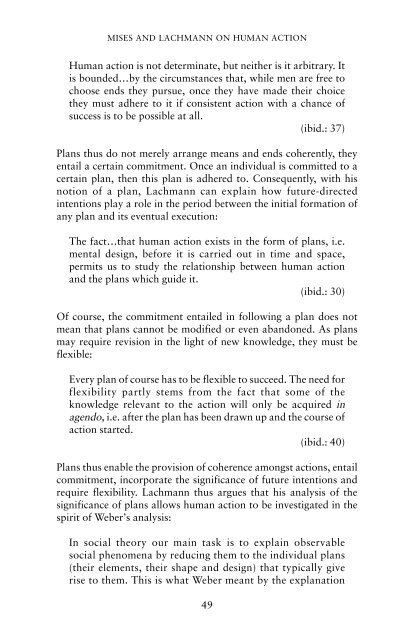Subjectivism and Economic Analysis: Essays in memory of Ludwig ...
Subjectivism and Economic Analysis: Essays in memory of Ludwig ...
Subjectivism and Economic Analysis: Essays in memory of Ludwig ...
Create successful ePaper yourself
Turn your PDF publications into a flip-book with our unique Google optimized e-Paper software.
MISES AND LACHMANN ON HUMAN ACTIONHuman action is not determ<strong>in</strong>ate, but neither is it arbitrary. Itis bounded…by the circumstances that, while men are free tochoose ends they pursue, once they have made their choicethey must adhere to it if consistent action with a chance <strong>of</strong>success is to be possible at all.(ibid.: 37)Plans thus do not merely arrange means <strong>and</strong> ends coherently, theyentail a certa<strong>in</strong> commitment. Once an <strong>in</strong>dividual is committed to acerta<strong>in</strong> plan, then this plan is adhered to. Consequently, with hisnotion <strong>of</strong> a plan, Lachmann can expla<strong>in</strong> how future-directed<strong>in</strong>tentions play a role <strong>in</strong> the period between the <strong>in</strong>itial formation <strong>of</strong>any plan <strong>and</strong> its eventual execution:The fact…that human action exists <strong>in</strong> the form <strong>of</strong> plans, i.e.mental design, before it is carried out <strong>in</strong> time <strong>and</strong> space,permits us to study the relationship between human action<strong>and</strong> the plans which guide it.(ibid.: 30)Of course, the commitment entailed <strong>in</strong> follow<strong>in</strong>g a plan does notmean that plans cannot be modified or even ab<strong>and</strong>oned. As plansmay require revision <strong>in</strong> the light <strong>of</strong> new knowledge, they must beflexible:Every plan <strong>of</strong> course has to be flexible to succeed. The need forflexibility partly stems from the fact that some <strong>of</strong> theknowledge relevant to the action will only be acquired <strong>in</strong>agendo, i.e. after the plan has been drawn up <strong>and</strong> the course <strong>of</strong>action started.(ibid.: 40)Plans thus enable the provision <strong>of</strong> coherence amongst actions, entailcommitment, <strong>in</strong>corporate the significance <strong>of</strong> future <strong>in</strong>tentions <strong>and</strong>require flexibility. Lachmann thus argues that his analysis <strong>of</strong> thesignificance <strong>of</strong> plans allows human action to be <strong>in</strong>vestigated <strong>in</strong> thespirit <strong>of</strong> Weber’s analysis:In social theory our ma<strong>in</strong> task is to expla<strong>in</strong> observablesocial phenomena by reduc<strong>in</strong>g them to the <strong>in</strong>dividual plans(their elements, their shape <strong>and</strong> design) that typically giverise to them. This is what Weber meant by the explanation49

















